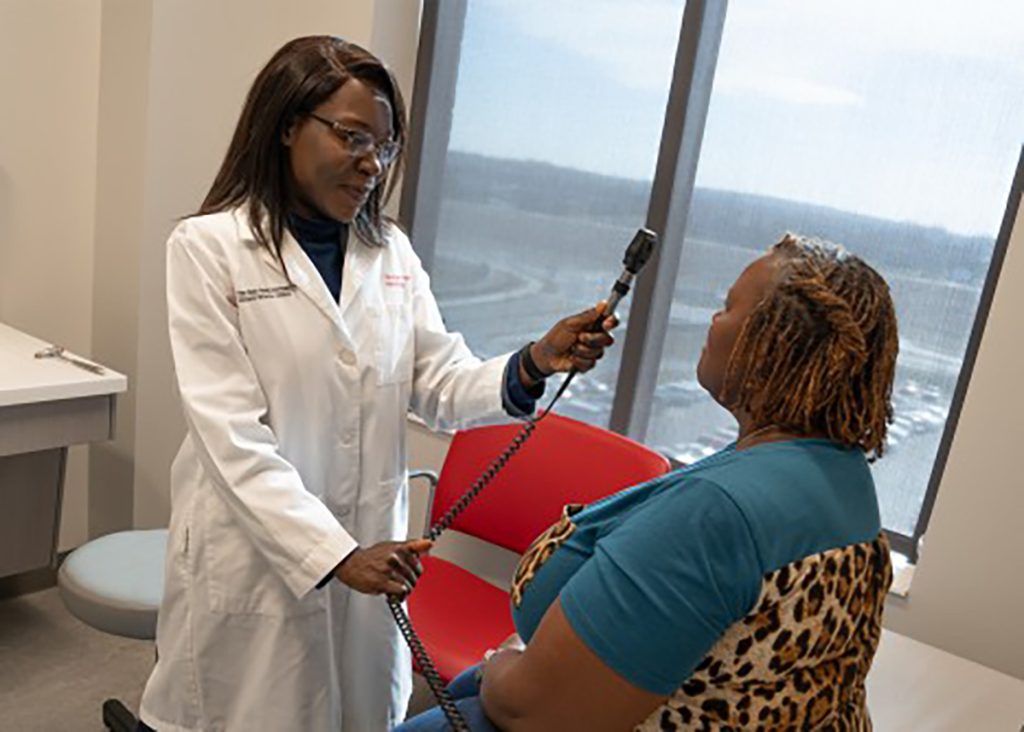Newswise — COLUMBUS, Ohio – Women are three times more likely than men to get diagnosed with multiple sclerosis (MS), an incurable disease that affects the central nervous system. Now, rates of MS are on the rise among Black women.
Research suggests that Black individuals may also be prone to more aggressive disease progression and greater disability, although the reasons are unknown.
“MS has historically been thought to affect white individuals, therefore there is a lack of awareness about the disease in other patient populations,” said Tirisham Gyang, MD, a neurologist at The Ohio State University Wexner Medical Center and College of Medicine.
As a result, there has been a lack of recognition of MS in non-white populations leading to an under-diagnosis of MS in Black individuals. There is also an under-representation of Black people in clinical trials. Gyang said.
MS is a condition where the body’s immune system attacks the optic nerves, brain and spinal cord, leading to inflammation. At first, it may present as episodes of neurological symptoms that drugs can often control, known as relapsing MS.

However, as time goes on, MS become more debilitating and less responsive to available treatments. This is known as progressive MS.
The first step to finding a cure for MS is ensuring all patients are adequately represented in clinical research, said Gyang, who is also director of the Division of Multiple Sclerosis and Neuroimmunology in the Department of Neurology at Ohio State.
“We want, specifically, populations that have been underrepresented to come out and to be in clinical trials so that we understand better how MS affects them,” Gyang said.
Even before Black women can consider joining clinical trials, they must first recognize their symptoms and seek treatment.
During college at The Ohio State University, club soccer kept Paula Cole busy. Then her first symptoms of MS appeared: vision problems, tripping and the sensation of pins and needles in her legs. One morning when she woke up, she couldn’t move her legs. An ambulance took her to the hospital where she soon learned she had MS.
“It felt like a death sentence,” said Cole, who was only 21 at the time. She eventually regained the ability to walk, and now more than 20 years later, she still plays soccer, along with running, biking and swimming.
Cole started seeing Gyang in 2021 and now takes medication to slow the progression of her disease. She has a new outlook on the future.
“I know, at times, my daughters must think ‘Mom has this incurable disease.’ In the past I’d get so down about that,” she said. “Now it’s almost celebratory. We can think about a future where mom is there, and mom is walking, and mom is participating.”
Cole also advocates for people with MS. She uses her platform as a business leader and a member of the National MS Society, where she serves as an Ohio Board of Trustee, District Activist Leader, Strategic Planning & Metric Committee Member.
Her goal is to shed light on the growing prevalence of the disease in Black people. Cole relishes the opportunity to stand with all affected by MS as they support research to find a cure.
“I continue to hope and pray that, as I can, I will be able to help others,” Cole said. “And as long as I’m helping others, I am doing what I was put on this earth to do.”





The doctors don’t have answers. I have relapse remitting MS- I don’t take any medications for MS because I found they made me worse. When on the drug I became blind and paralyzed every 4 months like clockwork … I’d get better after a month or two and the cycle continued for years until I stopped taking their medications. And started on herbal tincture from Health Herbs Clinic I have not been paralyzed or blind since. I am a “walking miracle” because I barely suffer symptoms anymore. Ayurvedic therapies from Natural Herbs Centre has helped me completely reverse my MS, I live a more productive life. Thank you for giving those of us with Multiple sclerosis a new hope. Google naturalherbscentre . co m
Sending you prayers, I was diagnosed in 2010 and seemed to go down hill quickly. In six years I could no longer work and had real problems with balance and joint pain. Brain fog was really bad sometimes. I took rebif and had a lot of problems and had to quit. I have been on techfadera (not spelled right) for a few years and have several side effects. I felt lost and decided to quit my meds due to side effects. Our care provider introduced me to Ayurvedic treatment. I had a total decline of all symptoms including vision problems, numbness and others. Sometimes, i totally forget i ever had MS. Visit Natural Herbs Centre web-site naturalherbscentre. com. I am very pleased with this treatment. I eat well, sleep well and exercise regularly. God bless all MS Warriors